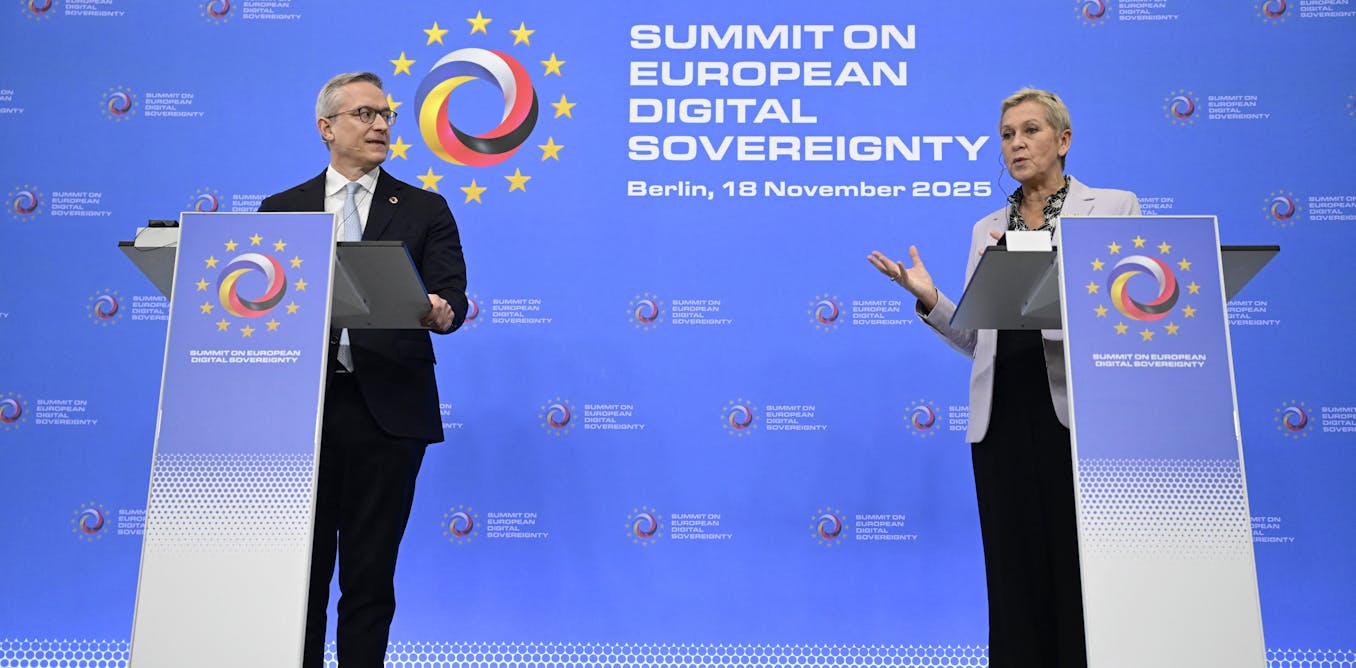Over the past decade, prominent European politicians seemed to think that legal regulation would be enough to control the internet. They focused primarily on drafting laws to regulate foreign platforms rather than prioritising investment in developing European alternatives. This focus contributed to producing the internet Europeans experience today, in which users typically must rely on foreign private platforms for modern necessities like search engines, maps, communication, online commerce, social media, cloud storage, and AI software, owing to the lack of compelling homegrown services.
Why did EU legislators place so much stock in the promise and power of legislation? And why have those same legislators gradually moved, since 2020 – and particularly since Donald Trump’s election to a second term as US president in late 2024 – towards a viewpoint that instead emphasises the limitations of legal solutions and the need for ownership and control of digital infrastructure?
Two policy paradigms
European political leaders have paid lip service to the need for so-called digital sovereignty), a slogan that typically refers to the need for control of digital technology, not just regulation. French President Emmanuel Macron and former German chancellor Angela Merkel began emphasising the issue in 2017 and 2019, respectively. In 2020, Merkel committed to establish “digital sovereignty as a leitmotif of European digital policy”. And since then, European Commission President Ursula von der Leyen has made sovereignty a “centrepiece of her Commission’s digital agenda”.
But at the same time – at least until 2024 – politicians’ actual solution has been “an almost exclusive focus on the regulation of services by US tech platforms”. This focus was based on a more optimistic presumption: that the EU could achieve its objectives by controlling foreign tech platforms through law because the bloc sat in the driver’s seat for governing the global internet.
This optimistic view of Europe’s role was encouraged by legal scholarship between 2012 and 2022, which promoted a positive and confident vision of Europe’s “global regulatory power” – the idea that the EU writes the rulebook for the global internet – and the idea of “digital constitutionalism” – that this rulebook has the power “to rein in” platforms such as Meta, X and TikTok, thus manifesting European notions of privacy and the rule of law in the online platform economy.
But it’s important to understand that unlike the idea of digital sovereignty, which emphasises the need for concrete policy change, digital constitutionalism is primarily an interpretive movement. By looking through a “constitutionalist lens”, scholars reinterpreted a period of intense privatisation online as a more benign development, which gained “superficial appeal” from the legitimating vocabulary of constitutional law. This encouraged a rose-coloured view of Europe’s position in the internet economy, allowing scholars and policymakers to miss the deepening crisis of its technological dependence until it was arguably too late: the return of Trump in 2024.
The influence of ‘The Brussels Effect’
In 2012, Columbia University law professor Anu Bradford published “The Brussels Effect”, a seminal article that influenced a generation of legal scholars and policymakers. It painted a compelling picture of the EU as a “benign regulatory hegemon”, or rulemaking superpower. For Bradford, it was US citizens who were subject to European power every day. As the author put it: “Few Americans are aware that EU regulations determine the makeup they apply in the morning, the cereal they eat for breakfast, the software they use on their computer, and the privacy settings they adjust on their Facebook page.”
Bradford explained that the EU could leverage access to its huge consumer market to impose stringent standards on internet companies, and those companies, in many cases, would apply those standards globally to benefit from economies of scale, rather than engage in the costly business of tailoring services to the particular regulations of each country. “All the EU needs to do,” she said after publishing the book version of The Brussels Effect in 2020, “is to regulate its internal market, and it is then the global companies that globalise those EU rules”.
In her book, Bradford demonstrated how tech giants like Facebook and Google had complied with EU online privacy standards and applied them globally. An important question, however, which Bradford never quite resolved, was who had made the decision really: the EU legislator or the companies in Silicon Valley? Had the EU legislator actually compelled the platforms to comply, or had the platforms, for reasons of their own, merely decided it was in their interest to play ball with the EU for the time being?
Since late 2024, it has seemed increasingly likely that the apparent power of EU law has actually been dependent upon the platforms’ willingness to comply, and their willingness has now run out.
A reality check… and a path forward?
Trump’s election win shook European politicians’ belief in the optimistic vision espoused by Bradford and the constitutionalists. So did the events that followed. In early January 2025, Meta announced major changes in its content moderation policies, including that it would stop working with outside fact-checkers, signalling allegiance to the White House’s vision of online free speech. Later that month, big tech executives were prominently in attendance at the inauguration in Washington. It has become gradually more difficult for Europeans to sustain the optimistic constitutionalist view of the past decade. Even authors prominently associated with digital constitutionalism have begun to see the glass half empty. Writing in Verfassungsblog in February, Giovanni De Gregorio and Simona Demková recognised a “looming enforcement crisis” and a “need to reassess the European approach to regulating the digital age”.
The publication in September 2024 of a major report, “The future of European competitiveness” by former European Central Bank president Mario Draghi, had already sent shockwaves through the EU political community. With dire warnings regarding the costs of the EU’s status-quo regulatory strategies and the depth of Europe’s technological dependence – “the EU relies on foreign countries for over 80% of digital products, services, infrastructure and intellectual property”, according to the text – the report weakened the bloc’s belief in legal solutions.
Following the report and Trump’s win, and amid the first year of the new US administration, members of the European parliament such as Alexandra Geese, Axel Voss and Aura Salla have swung towards the sovereignty paradigm with a new fervour, embracing an enforcement-focused legal “simplification” agenda that borders on deregulation, and supporting research for funding and policy proposals that would likely have seemed farfetched even two years ago. Ideas for public service media alternatives include an AI-powered “European News Streaming Platform”. And then there’s the EuroStack, an initiative for investment in Europe-based digital infrastructures.
The news platform is still somewhat speculative, but the EuroStack initiative has gained significant traction in Brussels. The EU commissioner for technological sovereignty, Henna Virkunnen, spoke at a EuroStack event in June. Her speech came a little more than six months after a EuroStack pitch document criticised the bloc’s years of US-focused regulation as a misstep that has likely condemned the EU to a future “as a definitive and irreversible ‘US colony’ in digital infrastructure”. Today, as the European Commission “prepares to simplify digital rules with a new omnibus plan”, it appears that EU politicians’ belief in the optimistic, constitutionalist paradigm has significantly deteriorated, if not collapsed.
But old habits die hard, and the EU has for decades been described as a “regulatory state” that effects change primarily through legal rulemaking. It must now resist slipping back into that comfort zone, and also take care, while simplifying the rules, not to destroy the essence of the regulations it has built. If the EU is to offer a genuinely alternative and rights-conscious vision of the internet, it must cast off idealistic visions of achieving hegemony through law and redirect its energies towards technological creation. Initiatives like the Eurostack and the European News Streaming Platform appear to offer promising places to start.
A weekly e-mail in English featuring expertise from scholars and researchers. It provides an introduction to the diversity of research coming out of the continent and considers some of the key issues facing European countries. Get the newsletter!



